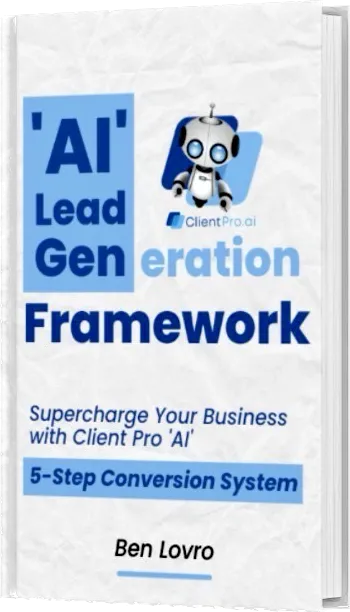Ben Lovro Blogs
AI' Client Conversion Framework

How To Find Buyers For Wholesale Real Estate?
Introduction
Wholesaling real estate can be an incredibly lucrative venture when done right. Central to its success is not just finding the right properties but also ensuring that you have a reliable list of potential buyers ready to take the deals off your hands. This article delves into effective strategies to create and grow a robust buyer's list, ensuring consistent and profitable transactions.

Understanding Wholesale Real Estate
Before diving into buyer-acquisition techniques, it's crucial to understand the core of wholesaling. In essence, a real estate wholesaler contracts a home with a seller, then finds an interested party to buy it. The wholesaler then assigns the contract to the buyer, and the difference between the contracted price and the amount the buyer pays is the wholesaler's profit.
The challenge? Finding those buyers in a timely and cost-efficient manner. Wholesale real estate stands as a distinctive and strategic facet of the broader real estate industry.
At its essence, it involves an intermediary, known as the wholesaler, who enters into a contractual agreement with a property seller and then assigns that contract to an end buyer, typically an investor. The profit derived from this transaction arises from the difference between the original contracted price with the seller and the amount the end buyer agrees to pay.
This approach allows individuals to participate in the property market without the need to invest large sums in purchasing or holding the real estate. It hinges primarily on the wholesaler's ability to identify underpriced or distressed properties and then swiftly connect with potential buyers who perceive value in such deals. As the process bypasses the traditional sale and purchase steps, efficiency, keen market insight, and an expansive network become paramount for success in wholesaling.
1. Networking with Industry Professionals
Real estate is an industry built on relationships. Connecting with professionals, from real estate agents to property managers and fellow investors, can open doors to potential buyers. Attend local real estate networking events, seminars, and workshops. Engage in conversations, exchange business cards, and keep in touch with those you meet.
Networking with industry professionals stands as a cornerstone in various business sectors, but in fields like real estate, its significance escalates manifold. Establishing robust connections with seasoned professionals can unlock avenues of knowledge, resources, and opportunities previously inaccessible to an individual. When one interacts and collaborates with peers and experts, they gain insights into best practices, emerging market trends, and innovative strategies.
A robust professional network can facilitate introductions to potential clients, partners, or investors, accelerating business growth. Equally valuable are the mentorship opportunities that can arise, guiding newcomers through the nuances and challenges of the industry. Yet, networking isn't a mere transactional activity. It's about building genuine, lasting relationships based on mutual respect, trust, and shared aspirations.
In essence, a strong professional network is both a safety net and a ladder, aiding in navigating challenges and reaching greater heights in one's career.
2. Leverage Real Estate Investment Groups
Many cities have Real Estate Investor Associations (REIAs) that host monthly meetings. Join these groups to meet cash buyers actively searching for their next investment. By attending consistently, you can establish your reputation and credibility.
3. Use Online Platforms
There are numerous online platforms, such as BiggerPockets, Connected Investors, and Facebook real estate groups, where wholesalers can connect with potential buyers. Posting details about your properties or even just engaging in community discussions can get your name out there.
The advent of digital transformation has introduced an array of online platforms that have reshaped the way businesses operate and interact with their audiences. These platforms, ranging from social media to specialized industry portals, offer an unparalleled opportunity for professionals to widen their reach, enhance their brand visibility, and foster deeper connections.
By strategically leveraging online platforms, businesses can not only tap into a global audience but also access real-time feedback, tailor their offerings to niche markets, and remain agile in an ever-evolving digital landscape. Furthermore, online platforms have democratized information, enabling even startups and individual entrepreneurs to compete with established entities by showcasing their unique value propositions.
In this context, mastering the art of utilizing online platforms isn't just a competitive advantage—it's a necessity. Those who can adeptly navigate the digital realm are poised to harness its vast potential, driving innovation, engagement, and growth in the modern age.
4. Classified Ads
Platforms like Craigslist or local newspapers can be surprisingly effective. By posting in the real estate sections, you can reach out to local buyers actively scouring for deals.
5. Bandit Signs
These are the small signs often seen on the side of the road with messages like "We Buy Houses." While they can be an effective method to attract buyers, ensure you're compliant with local regulations regarding their use.
6. Direct Mail Campaigns
Mailing lists can be bought or developed over time, detailing investors in your area. A well-crafted letter or postcard about a property deal can grab attention and lead to potential sales. Direct mail campaigns, often perceived as a traditional marketing strategy, continue to hold significant relevance in today's multifaceted advertising landscape.
In an age dominated by digital noise, the tangibility of a well-crafted piece of direct mail can make a profound impression. These campaigns offer a personal touch, delivering physical materials—be it postcards, newsletters, or brochures—directly to the recipient's mailbox.
The tactile nature of such materials often resonates deeply, fostering a more intimate connection between the brand and its audience. Furthermore, direct mail campaigns allow for precise targeting, ensuring that promotional materials reach a specific demographic based on criteria such as age, purchasing behavior, or geographical location.
This level of customization amplifies the campaign's effectiveness. Additionally, when combined with digital strategies, direct mail can act as a powerful touchpoint, reinforcing brand messages and driving engagement. In essence, the strategic implementation of direct mail campaigns remains a formidable tool in a marketer's arsenal, marrying the physical with the digital in captivating ways.
7. Host Open Houses
Once you've secured a property under contract, consider hosting an open house. This attracts local investors looking for deals in the area and can often lead to immediate offers.
8. Build a Digital Presence
Create a professional website detailing your services and listings. Couple this with an active presence on social media platforms, targeting local real estate investment groups. Over time, this not only attracts buyers but also establishes your brand in the market.
The amalgamation of a compelling website and an engaging social media presence does more than just draw prospective buyers. It incrementally builds a recognizable brand identity in the market. As you consistently provide valuable content and showcase your expertise, trust is fostered.
Over time, this trust translates into brand loyalty, repeat business, and a reputation that precedes you. In the competitive realm of real estate, such a comprehensive digital approach can be the differentiator, setting you apart from the myriad of competitors.
9. Work with Hard Money Lenders
These lenders work exclusively with real estate investors. They can often refer you to their clients who are always on the lookout for their next deal.
10. Educate and Offer Value
Consider hosting workshops or seminars on real estate investment. By offering educational value, you can attract potential buyers and establish yourself as an authority in the field.
In the dynamic landscape of business and commerce, the dual principles of education and offering value stand paramount. These foundational elements transcend mere transactional interactions, fostering long-lasting relationships with clients and customers.
By prioritizing education, businesses position themselves as thought leaders and authoritative figures in their respective domains. This approach demystifies complex subjects for the consumer, engendering trust and establishing the business as a reliable source of information. Complementing this, when a company consistently offers genuine value, it accentuates its commitment to customer satisfaction beyond the immediate sale.
Value can manifest in numerous ways, from high-quality products and exceptional service to post-purchase support and loyalty rewards. Together, education and value not only differentiate businesses in competitive markets but also cement their reputations as entities that prioritize client enrichment and empowerment. Ultimately, these principles underscore a holistic approach to business, where relationships and shared growth become focal points.
Conclusion
In the world of wholesale real estate, your buyers' list is as valuable as the properties you're looking to sell. Cultivating a diverse and extensive list ensures that once you secure a property under contract, you can move it quickly, capitalizing on your efforts. By employing a combination of the strategies above, tailored to your local market and strengths, you can grow a list that serves as a consistent and lucrative source of income.
As with any business venture, consistency is key. Continuous efforts in networking, education, and leveraging multiple platforms will ensure a steady stream of buyers eager to work with you. Remember, in wholesaling, time is often of the essence, so having a ready list of potential buyers can be the difference between a profitable deal and a missed opportunity.
Contact Us

Bet On Yourself
Empowering entrepreneurs and real estate investors with the tools they need to scale.
ben@clientpro.ai
(803) 921-9915
100 Old Cherokee Road ste f 342





